People
In a welfare state gone sour,
Vegavan dasa presents an alternative
to moral anarchy.
by Yogesvara dasa
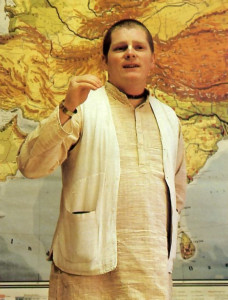 Vegavan dasa makes his home at the peaceful Krsna conscious farm community called New Radhakunda, twenty miles south of Stockholm in Korsnas Gard. But his life is hardly one of obscurity. His weekly all-night call-in show, Radio Krsna, and his university lectures on the spiritual traditions of India have made him well known in and around Stockholm. And since New Radhakunda offers a practical view of Vedic social planning, Vegavan also speaks to many of the philosophy and religion classes that visit the farm daily.
Vegavan dasa makes his home at the peaceful Krsna conscious farm community called New Radhakunda, twenty miles south of Stockholm in Korsnas Gard. But his life is hardly one of obscurity. His weekly all-night call-in show, Radio Krsna, and his university lectures on the spiritual traditions of India have made him well known in and around Stockholm. And since New Radhakunda offers a practical view of Vedic social planning, Vegavan also speaks to many of the philosophy and religion classes that visit the farm daily.
Vegavan’s role as a spokesman for Krsna culture extends even to the national level. As a member of the Swedish Forum for Religions and World Views, an ecumenical council of educators and religious leaders, he periodically presents Krsna conscious plans for spiritual social reform to members of the Swedish socialist government. In seminars and published articles, Vegavan proposes a shift in emphasis away from the Social Democratic preoccupation with economic development and dependence on a welfare state to a self-sufficient, community-based society centered on God consciousness and simple human ideals.
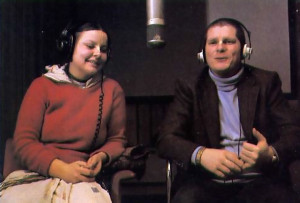
Radio Krsna is a major vehicle for the Vedic system of social reform, called varnasrama. The all-night radio show combines Krsna conscious philosophy and discussion with music, drama, and guest appearances to produce one of Stockholm’s most popular programs.
“What surprises me most is the sincere, nitty-gritty questions our listeners ask,” Vegavan says. “There is a spiritual curiosity in this country that has gone unsatisfied for years. I get questions like ‘If the whole country were to become God conscious, who would do the work?’ So I explain that the Vedic system does not prescribe renouncing one’s occupation to become God conscious, but rather executing one’s prescribed duties for the pleasure of the Supreme Lord. A farmer continues to farm, but he offers a portion of the harvest to God’s temple so that sanctified foods can be distributed for everyone’s purification. A businessman continues his business, but he offers professional services, goods, or money to help spread God consciousness. The artist uses his or her talents to glorify God, and so on. Nothing stops, but the consciousness of the members of society changes from self-centered to God-centered.
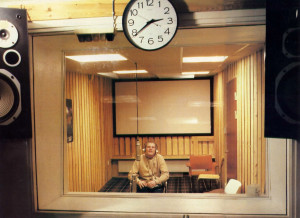
“Our lines are jammed from midnight to 6 A.M. An important reason for the show’s success is that we touch on real issues and give practical solutions. We go into detail about everything from medicine to meditation, from international policy to the economy, abortion, and natural foods.
“Energy is also a big topic. I tell listeners that the varnasrama system encourages an agrarian society based on cow protection. Today’s huge agribusinesses with their petroleum-based fertilizers simply make us more and more dependent on foreign oil and deplete the natural qualities of the soil. Cow dung is the best of all natural fertilizers and can be used to produce methane gas for lighting, heating, and cooking. At our farm community, rather than slaughter cows and bulls, we use the cow’s milk to prepare many wonderful foods, and we use the bulls to till the ground. In this way society becomes free from the dependency on oil and machinery. People call to tell me the show is so interesting that they can’t turn it off and end up staying awake until we go off the air at 6 A.M Many people know that the present social system in Sweden lacks fundamental truth, and this shows up in our listeners’ response to Radio Krsna.”
In his broadcasts and lectures, Vegavan quotes freely from the Bhagavad-gita, which gives the spiritual foundation of the varnasrama system. Translations of the Gita have existed in Swedish since the late 1890s. State policy, however, has always discouraged participation in non-Lutheran cultures. In fact, it wasn’t until Srila Prabhupada’s Bhagavad-gita As It Is first appeared here in Swedish (translated from the English by Vegavan) that Swedes began to take seriously the practical spiritual knowledge available in India’s Vedic literatures. Isolated by geography and tradition, they had concentrated on exploiting Sweden’s vast natural resources and evolving a socialist government of collectivities and farm settlements. By the end of the Second World War, economic advancement had become the nation’s driving force.
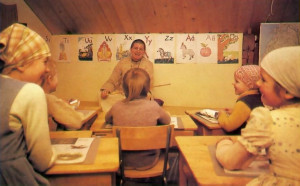
But the all-encompassing welfare state that has burgeoned since the war and the material benefits the state has produced have failed to bridge the chasm between Social Democratic idealism and the growing number of dissidents, between the promises of material perfection and the rising dissatisfaction with an impersonal, soulless society.
“Swedes got their first taste of austerity when the oil crisis struck in 1973,” Vegavan explains. “For the first time a lot of people considered that maybe material prosperity wasn’t quite the panacea it was cracked up to be. Interestingly, with the growing uncertainty over the economy has come an increased interest in topics like reincarnation, meditation, yoga, and vegetarianism. That’s one reason why our direct presentation of Krsna consciousness has met with so much success. People here admire that we’ve taken a bold stand and dared to do something different. As they see their artificial economic values falter, more and more Swedes are voicing respect for the spiritual values devotees represent: honesty, morality, cleanliness, simplicity.”

Four years ago Vegavan helped pioneer the New Radhakunda farm, which got its name from a holy place in India where Lord Krsna enjoyed pastimes five thousand years ago. The model Vedic community embodies many principles of the varnasrama philosophy. Residents all follow the basic rules of Krsna conscious life: no meat-eating, no illicit sex, no taking of intoxicants, and no gambling. They rise early and observe a morning program of worship, study, and meditation. After breakfast the fifteen school-aged children go off to classes in reading, writing, mathematics, and Krsna conscious subjects, and (for the older ones) history, geography, nature study, and Sanskrit. Adults form various work teams: farmers, cooks, a maintenance crew, administration and teaching staffs, artists, and a group of thirteen translators, typists, editors, and designers who work on publishing editions of the Vedic scriptures in Eastern European languages. In addition, three devotees run Govinda’s, a popular vegetarian restaurant in downtown Stockholm. Everyone gathers at one o’clock for lunch and again in the evening for temple ceremonies and a class on the Bhagavad-gita.
New Radhakunda receives hundreds of weekly visitors who seek practical spiritual guidance. “In recent years,” Vegavan explains, “Swedes have experimented with a new kind of collectivity—one based on ecological principles and idealistic theories of human equality. A leader from the largest of these communes came to see me last week requesting that we step in and help salvage the project from dissolution. Months of trial and error on their part—open classrooms, free love—had left basic questions unanswered: What should the communal goals be? What constitutes appropriate sexual relations and family life? How can the commune avoid factions and private interests?
“Most communes fail to recognize that a viable social organization does not just emerge from a shared desire for cooperation and a willingness to work hard. There must be a foundation of spiritual training and devotional service to God. People from troubled communes come to Krsna’s farm because they see the devotees happy, cooperating, raising wholesome children—enjoying everything they’ve been striving for and more. Our advantage is our heritage—thousands of years of precedent for the programs we follow, all described in detail in the Vedic literatures. Rather than speculate about community life or spiritual practices, we follow the Vedic tradition: put Lord Krsna in the center and serve Him under the guidance of a bona fide guru and the scriptures.”
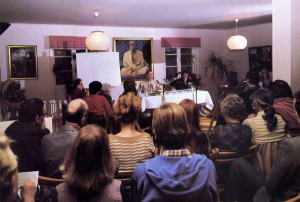
In Sweden, where people tend to be absorbed into a secular welfare state, a successful spiritual community like New Radhakunda is something of an anomaly. Having been educated to believe that a good standard of living is the proper goal of human life, many Swedes have until recently considered themselves fulfilled and let the spiritual side of life languish.
“But now,” says Vegavan, “things have begun to change. There is a widespread feeling that life’s spiritual dimension has been cruelly neglected. Swedish theologians replaced service to God with service to man, and that confused religion with social policy. The consequences were predictable: moral anarchy. in a country of eight million there are more than a million alcoholics. There are six suicides a day and 34,000 abortions a year—one out of every four pregnancies. More than half of all marriages break up. Although the per-capita income is among the highest in the world, the Swedes are suffering like anything.
“Perhaps partly in response to the severe social problems here, Swedes have given Krsna consciousness a dramatically favorable reception. In 1973 Srila Prabhupada lectured to an auditorium of students at Uppsala University. He spoke about the varnasrama system, the division of society into classes according to individual capacity and inclination, and about the need to recognize God as the proprietor of all creation and the true center of human endeavor. Although the students were socialists, they gave him a standing ovation, and devotees have been welcome guests in classrooms here ever since.”
But the open-armed reception of Krsna consciousness in Swedish classrooms has two distinct sides. One is a real interest among teachers and students in an ancient spiritual culture that offers a working plan for social reorganization; the other is a perfunctory treatment of religion by the State Education Department, which is geared toward discrediting God consciousness as a meaningful personal and social way of life. In fact, starting in the upper grades of secondary school, instructors present religions of the world as an escape from reality.
“What no one seems to have anticipated,” comments Vegavan, “is the feasibility of Krsna culture as a viable social program. By inviting us into the classroom, officials may have expected to see us hang by our own rope, but instead they’ve been surprised by the positive response we’ve gotten. Students from the State Teachers’ Training College spent two days at the Krsna farm and left so enthusiastic over the variety of activities, the talent, the practicality of how devotees live that many have become friends and supporters. Word has spread. Last week the Sociology Department of Uppsala University invited us to participate in a four-day symposium called ‘Practical Utopia.’ Researchers from the department want to know what makes New Radhakunda tick so well.”
A high-school teacher from Stockholm who brought his class to visit New Radhakunda commented, “Swedish materialistic idealism is exaggerated. Especially the young people here have strong intimations of a need for higher spiritual purposes. Of course, by and large they still think in terms of a new stereo set, but they nonetheless respect Hare Krsna devotees for posing essential questions—Who am I? Who is God?—and for living truly committed lives of devotion.”
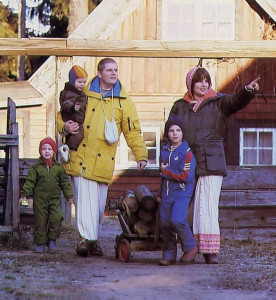
Says Dr. Bertil Persson, Sweden’s leading authority on Middle Eastern religions and author of school textbooks on comparative religion, “Coming in contact with the Krsna culture has affected students in this country in four ways. First, it has given them a new perspective on man as an entity with a positive spiritual identity. Second, it has given them a new perspective on God as something more than a mere principle, as a living transcendental person who reciprocates with His devotees. Third, having devotees address students has removed many prejudices over India and other religious traditions and has opened their minds to unfamiliar spiritual ideas. For example, for the first time they are confronted with the striking prospect of death not as an end but as a beginning. Finally, Krsna consciousness has forced students to reconsider their vision of the caste system (varnasrama). All they have known has been the stereotyped condemnation of an archaic, exploitative idea. It never occurred to them—nor were they ever encouraged to think—that material divisions in society do not preclude spiritual unity.”
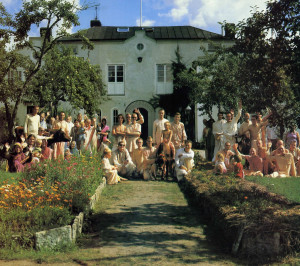
Vegavan has high hopes for the future of Sweden’s varnasrama project, but he is realistic about immediate prospects. “Young people in Sweden find little appealing at home. Old people are losing their jobs. Taxes here are the highest in the world. There is a lot of bitterness toward the establishment, so there is bound to be change. But religion—all religion—is still seen by most people as part of the establishment. So I expect politics to remain the major recourse for dissenters for quite some time.
“Nonetheless, the Krsna consciousness movement has become the best known and the most respected spiritual community in the country. If we as devotees remain pure, both in our personal lives and in our presentation of Krsna consciousness, I have no doubt that our contribution will be a lasting one.”

Wow that was 80s. What happened then. Where are the illustrious devotees. Why is the sad status now. What is the leadership doing.
Låt oss alla sjunga Hare Krishna dansa och vara Glada tillsammans som midsommar!